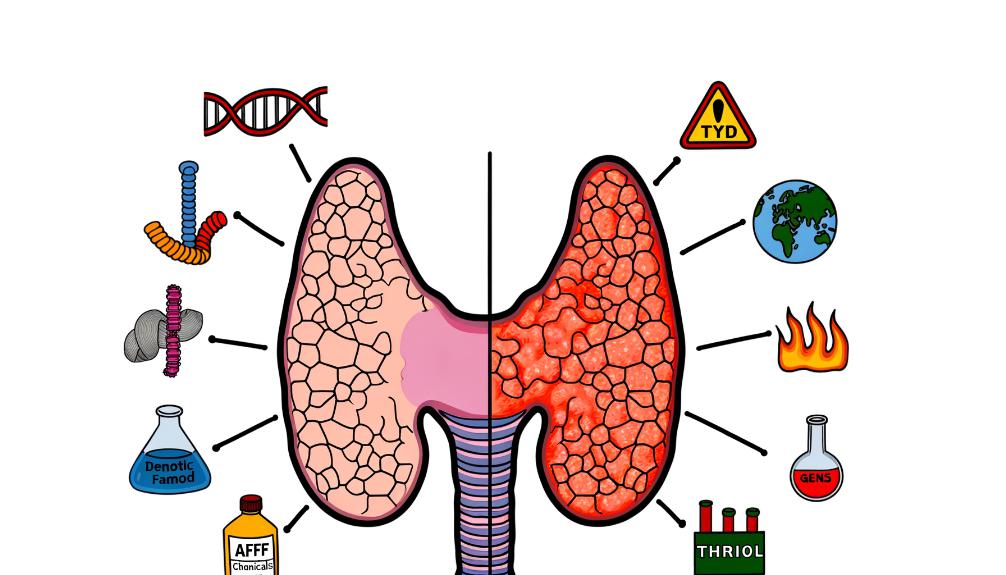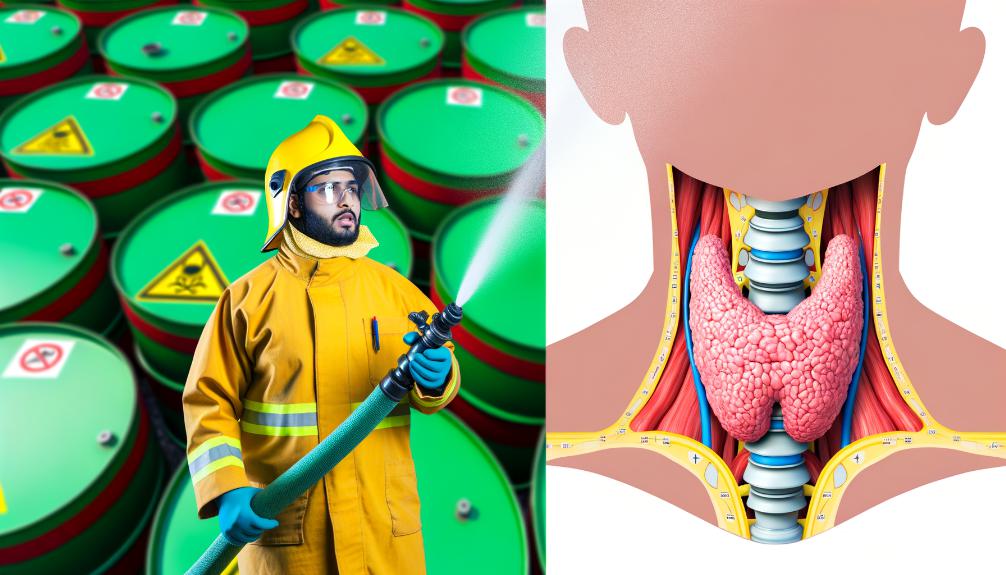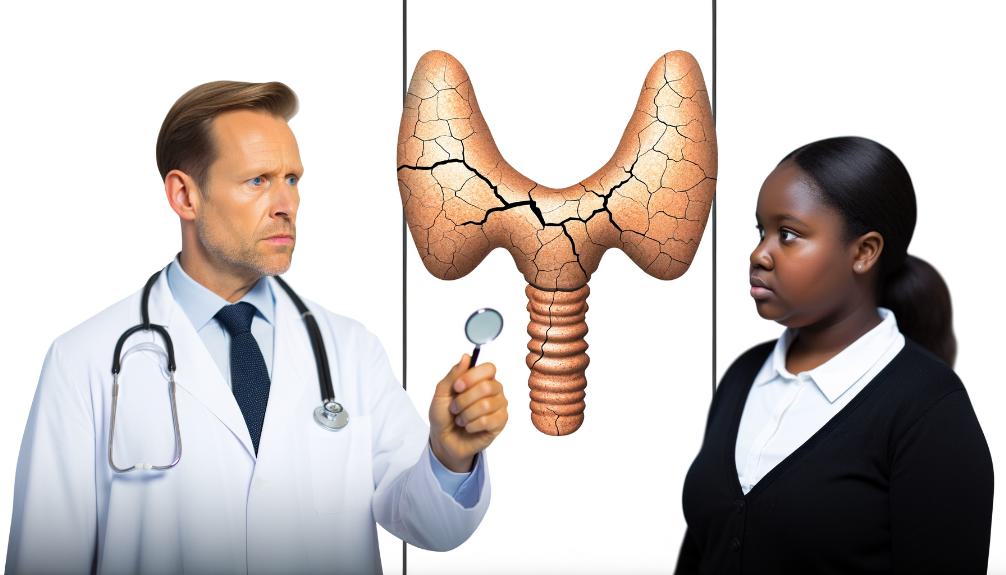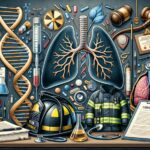Thyroid Cancer Causes: AFFF Vs. Other Factors
We've identified that while AFFF exposure poses a significant threat to thyroid health due to its PFAS content, other factors also contribute to thyroid cancer risk. These include genetics, radiation exposure, iodine deficiency, and lifestyle choices. For individuals, especially firefighters, who've encountered AFFF, the link to thyroid dysfunction and cancer is a pressing concern. However, understanding the myriad of contributing elements is essential for a holistic approach to prevention and management. For those affected, legal avenues offer support and compensation, highlighting the importance of informed choices regarding health and legal rights. With thorough insight, affected parties can navigate their options more effectively.

Key Takeaways
- AFFF exposure increases thyroid cancer risk due to PFAS, which disrupt thyroid function.
- Women are more susceptible to thyroid cancer, influenced by factors beyond AFFF exposure.
- Dietary iodine deficiency and radiation exposure are significant risk factors unrelated to AFFF.
- Firefighters have a heightened risk from AFFF but lifestyle choices also play a crucial role.
- Genetic predispositions can elevate thyroid cancer risk independently of environmental factors like AFFF.
Understanding Thyroid Cancer

While thyroid cancer may not be as widely discussed as other types, it's important that we grasp its significant impact, especially considering that its incidence is nearly three times higher in women than in men. With around 43,720 new cases diagnosed annually in the U.S. alone, understanding the factors that contribute to this form of cancer is essential for both prevention and early intervention.
One particular area of concern is the exposure to Aqueous Film Forming Foam (AFFF) among firefighters. This firefighting foam, which contains between 50% and 98% Per- and Polyfluoroalkyl Substances (PFAS), poses a significant risk to thyroid health. PFAS are toxic substances linked to an increased risk of thyroid cancer, due to their ability to interfere with thyroid function. Given the critical role the thyroid plays in regulating metabolism, growth, and development, the potential for toxic exposure to impact thyroid health is a matter of serious concern.
The risk is particularly pronounced for firefighters, who may encounter AFFF in the line of duty. The presence of PFAS in firefighting foam and the resulting toxic exposure elevate the risk of a thyroid cancer diagnosis. This underscores the importance of understanding and mitigating such risks to protect those who protect us.
As we explore further into the nuances of thyroid cancer, it's paramount that we consider all potential risk factors, including AFFF exposure among firefighters. Recognizing the signs and symptoms of thyroid cancer—such as neck lumps, voice changes, and difficulty swallowing—can aid in early diagnosis and treatment, ultimately safeguarding thyroid health and well-being.
Common Causes of Thyroid Cancer
We must acknowledge that thyroid cancer arises from various factors, including iodine-deficient diets, radiation exposure, genetic predispositions, and gender-specific risks, alongside important concerns like AFFF exposure in firefighters. It's vital to understand that each of these factors plays a unique role in influencing the risk of developing thyroid cancer.
Firstly, a diet low in iodine can greatly impair thyroid function, making the gland more susceptible to disease. Iodine is essential for producing thyroid hormones, and a deficiency can lead to abnormalities, including cancer. In addition, radiation exposure, particularly in childhood, greatly increases the risk of thyroid cancer. This can stem from medical treatments or environmental exposure to radioactive materials.
Genetics also play a crucial role in the likelihood of developing thyroid cancer. Certain genetic mutations and familial patterns can predispose individuals to this condition, highlighting the importance of understanding one's family health history. Moreover, being female is another risk factor for thyroid cancer. Women are more likely to develop this type of cancer than men, suggesting a potential link between thyroid cancer and female hormones.
While we've briefly touched on the impact of AFFF exposure in firefighters due to the presence of PFAS, it's important to take into account these other risk factors. Each contributes to the complex landscape of thyroid cancer causes, beyond the important concern over firefighting foam. Understanding these risk factors can help in the early detection and prevention of thyroid cancer, emphasizing a multidimensional approach to tackling this health issue.
AFFF Exposure and Thyroid Risk

Acknowledging the array of factors contributing to thyroid cancer, it's also imperative to examine the specific risk posed by AFFF exposure. AFFF, or aqueous film-forming foam, is utilized by firefighters to combat fuel fires, but its safety for those exposed has come under scrutiny due to the presence of PFAS. These toxic chemicals, found in high concentrations in AFFF, between 50% and 98%, are linked with disrupting thyroid function, a critical factor in the development of thyroid cancer.
Firefighters, who are frequently in contact with AFFF during their duties, face a heightened risk. This is because PFAS, particularly PFOA, inhibits the accumulation of iodine by thyroid cells. Iodine is essential for proper thyroid function, and its disruption can lead to cancer development. Additionally, long-term exposure to these toxic substances amplifies the threat, making it a significant concern for those in the firefighting profession.
Research has shown that PFAS exposure can cause changes like hypertrophy and hyperplasia in thyroid cells, processes that can precede cancer. These findings underscore the importance of recognizing AFFF exposure as a major risk factor for thyroid cancer. Understanding the mechanisms, such as the interference with iodine accumulation and the alteration of thyroid cells, illuminates how exposure to these toxic chemicals could lead directly to cancer development.
We must prioritize investigating and addressing the risks associated with AFFF exposure, especially for firefighters, to mitigate the threat it poses to thyroid health and reduce the incidence of thyroid cancer linked to these hazardous substances.
Environmental and Lifestyle Factors
Shifting our focus to environmental and lifestyle factors, we find they play a significant role in the development of thyroid cancer. We've learned that not only do pollutants and a diet low in iodine contribute, but lifestyle choices such as smoking and obesity also have a profound impact. It's essential we grasp these influences to better assess risk and guide preventive strategies.
Pollution Exposure Risks
The invisible menace of pollution, including exposure to AFFF, significantly elevates the risk of thyroid cancer through both environmental and lifestyle factors. AFFF exposure, especially in firefighters, is a significant concern. The presence of PFAS in AFFF is known to disrupt thyroid function, directly linking it to an increased risk of thyroid cancer and other thyroid-related issues like goiter. Additionally, firefighters, due to their occupation, face a heightened risk compared to the general population. The compounding effects of lifestyle choices, such as tobacco and alcohol use, alongside pollution exposure, further exacerbate the risk factors for thyroid dysfunction and cancer. Ensuring thyroid health requires a critical examination of both environmental factors and personal lifestyle choices.
Dietary Influence Insights
After exploring the risks associated with pollution and lifestyle, we now shift our focus to how diet, particularly iodine intake, influences thyroid health and the potential for developing thyroid cancer. It's important to understand that dietary factors, including iodine intake, greatly impact thyroid function and thyroid cancer risk. Proper nutrition, rich in iodine, is essential for thyroid hormone synthesis and maintaining thyroid health, thereby reducing the likelihood of thyroid disorders. Environmental factors, such as AFFF exposure, alongside lifestyle choices like tobacco and alcohol use, can further disrupt thyroid function. By understanding the link between dietary, lifestyle, and environmental factors, we can better address the thyroid cancer risk factors associated with AFFF exposure and make informed choices to safeguard our thyroid health.
Symptoms and Medical Advice

Acknowledging symptoms such as neck lumps or voice changes early on is crucial for seeking prompt medical advice. We comprehend that the journey through identifying and responding to thyroid cancer symptoms can be challenging. Symptoms like neck lumps, voice changes, and difficulty swallowing aren't just discomforts—they're crucial signals from our bodies that something might be wrong. It's why we emphasize the importance of early detection. When we notice these warning signs, it's not just about recognizing them; it's about taking proactive steps towards medical intervention.
Prompt medical consultation becomes not just recommended but essential for individuals experiencing potential thyroid cancer symptoms. We can't stress enough how important it is to not delay in seeking medical advice upon noticing signs such as persistent neck lumps or unexplained hoarseness. The pathway to a timely diagnosis is paved with attentiveness to our bodies' signals and responding with urgency.
Timely diagnosis and subsequent treatment hold a profound impact on the prognosis of thyroid cancer. It's a journey that begins with us being vigilant about our health and ends with medical professionals guiding us towards the best possible outcomes. The connection between early detection and favorable prognosis cannot be overstated. Through understanding and responding to the symptoms of thyroid cancer, we empower ourselves and our loved ones to navigate this challenging terrain with the support of medical professionals. Let's prioritize our health and make sure that signs like neck lumps, voice changes, and difficulty swallowing are met with prompt medical consultation.
Support and Compensation Options
For firefighters facing thyroid cancer due to AFFF exposure, understanding support and compensation options is vital. We're here to guide our fellow firefighters through the complexities of seeking justice and compensation for the harm suffered. Legal assistance, tailored specifically for those affected by AFFF exposure, is readily available and can be a lifeline for many.
Eligible individuals, including both military and civilian firefighters, can receive compensation for their thyroid cancer linked to AFFF exposure. It's important to gather all necessary documentation, such as military or employment records and medical records, to support your claim. This step is essential for an accurate eligibility assessment for compensation.
Attorneys with over 30 years of experience in handling toxic exposure claims stand ready to offer their expertise. They understand the nuances of these cases and can provide invaluable legal assistance. Feedback from those who have navigated the compensation process highlights the importance of expert guidance in addressing the complexities of toxic exposure claims.
For military firefighters, submitting military records alongside medical records is a key part of the compensation assessment process. Similarly, civilian firefighters must provide employment history and medical documentation to evaluate their eligibility for compensation accurately.
We encourage all firefighters affected by thyroid cancer due to AFFF exposure to seek legal assistance. An eligibility assessment is the first step toward receiving the compensation you deserve. Remember, support is available, and you're not alone in this fight.

This post has been generated by AI and was not reviewed by editors. This is Not legal advice. Please consult with an attorney.




